听力课堂听力练习
高中英语教案:听力和阅读理解的训练
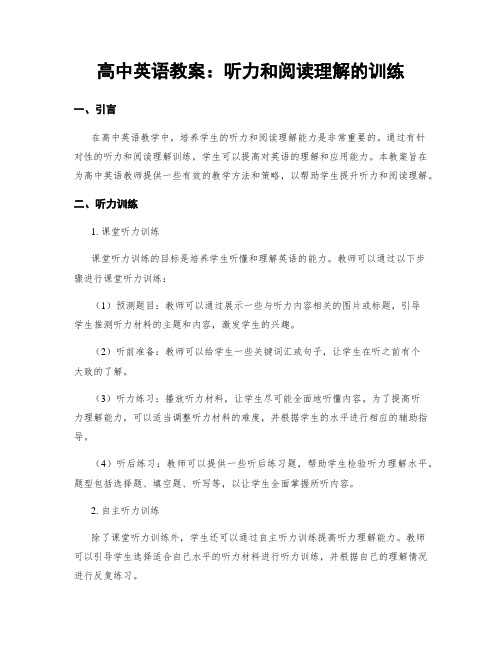
高中英语教案:听力和阅读理解的训练一、引言在高中英语教学中,培养学生的听力和阅读理解能力是非常重要的。
通过有针对性的听力和阅读理解训练,学生可以提高对英语的理解和应用能力。
本教案旨在为高中英语教师提供一些有效的教学方法和策略,以帮助学生提升听力和阅读理解。
二、听力训练1. 课堂听力训练课堂听力训练的目标是培养学生听懂和理解英语的能力。
教师可以通过以下步骤进行课堂听力训练:(1)预测题目:教师可以通过展示一些与听力内容相关的图片或标题,引导学生推测听力材料的主题和内容,激发学生的兴趣。
(2)听前准备:教师可以给学生一些关键词汇或句子,让学生在听之前有个大致的了解。
(3)听力练习:播放听力材料,让学生尽可能全面地听懂内容。
为了提高听力理解能力,可以适当调整听力材料的难度,并根据学生的水平进行相应的辅助指导。
(4)听后练习:教师可以提供一些听后练习题,帮助学生检验听力理解水平。
题型包括选择题、填空题、听写等,以让学生全面掌握所听内容。
2. 自主听力训练除了课堂听力训练外,学生还可以通过自主听力训练提高听力理解能力。
教师可以引导学生选择适合自己水平的听力材料进行听力训练,并根据自己的理解情况进行反复练习。
教师还可以推荐一些优质的听力资源,如英语电台、英语播客等,让学生选择自己感兴趣的内容进行听力训练。
同时,教师可以要求学生记录听力过程中不懂的生词和疑惑,以便在课堂上进行解答和讨论。
三、阅读理解训练阅读理解是培养学生英语应用能力的重要方法之一。
以下是一些有效的阅读理解训练方法:1. 预习与导读在学生进行阅读训练之前,教师可以通过预习和导读的方式提高学生对文本的理解和阅读策略的运用。
教师可以引导学生对文章的题目、图表、段落标签等进行预测,帮助学生更好地理解文章的结构和内容。
2. 精读与泛读教师可以根据教学目标和教材要求,设计一些精读和泛读的阅读训练。
精读可以帮助学生更深入地理解文章的细节和核心观点,泛读则可以提高学生对整篇文章的整体把握能力。
小学生英语听力训练方法
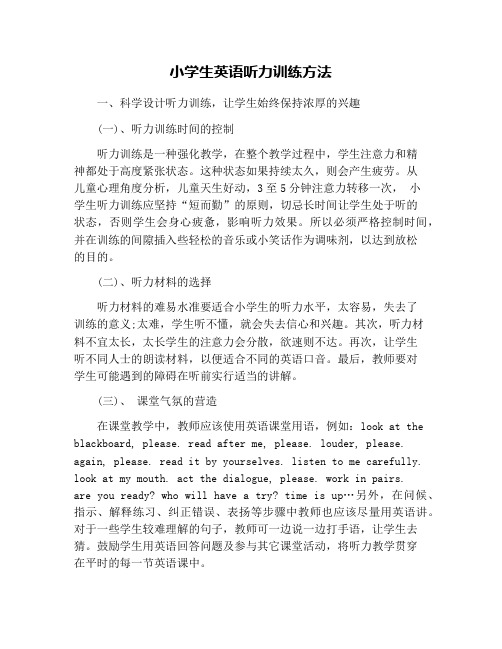
小学生英语听力训练方法一、科学设计听力训练,让学生始终保持浓厚的兴趣(一)、听力训练时间的控制听力训练是一种强化教学,在整个教学过程中,学生注意力和精神都处于高度紧张状态。
这种状态如果持续太久,则会产生疲劳。
从儿童心理角度分析,儿童天生好动,3至5分钟注意力转移一次,小学生听力训练应坚持“短而勤”的原则,切忌长时间让学生处于听的状态,否则学生会身心疲惫,影响听力效果。
所以必须严格控制时间,并在训练的间隙插入些轻松的音乐或小笑话作为调味剂,以达到放松的目的。
(二)、听力材料的选择听力材料的难易水准要适合小学生的听力水平,太容易,失去了训练的意义;太难,学生听不懂,就会失去信心和兴趣。
其次,听力材料不宜太长,太长学生的注意力会分散,欲速则不达。
再次,让学生听不同人士的朗读材料,以便适合不同的英语口音。
最后,教师要对学生可能遇到的障碍在听前实行适当的讲解。
(三)、课堂气氛的营造在课堂教学中,教师应该使用英语课堂用语,例如:look at the blackboard, please. read after me, please. louder, please. again, please. read it by yourselves. listen to me carefully. look at my mouth. act the dialogue, please. work in pairs.are you ready? who will have a try? time is up…另外,在问候、指示、解释练习、纠正错误、表扬等步骤中教师也应该尽量用英语讲。
对于一些学生较难理解的句子,教师可一边说一边打手语,让学生去猜。
鼓励学生用英语回答问题及参与其它课堂活动,将听力教学贯穿在平时的每一节英语课中。
二、提升听力水平的方法和技巧(一)、兴趣训练法现代心理学之父皮亚杰说:“所有智力方面的工作都要依赖于兴趣”。
英语人教版五年级下册听力及课堂练习

Thinking map(单词分类)请将错的单词在这里空白处每个抄写两遍,默写一遍:activities(活动) season weatherListen and finish the dialogue.(听录音填空。
)Part A Let’s talkMr Jones: Do you like the music,children?Mike: Yes.It's very beautiful.What is it?Mr Jones: The Four Seasons. Today we'll draw the seasons. Which do you like best ?Mike: . I like snow.Mr Jones: I like snow,too. Which do you like best ,Wu Yifan? Wu Yifan: . It's pretty.Mr Jones:Yes,it is.PartB Let’s talkAmy:Hello,Miss White.Look at my picture.Miss White: Good job!I like trees. The colours are very pretty!Amy: Yes . I like best. The weather is good and the colours are beautiful ! Which do you like best ,Miss White?Miss White: .Amy: .Miss White:Because I like vacation.一课一测一、短语互译。
windy________ summer vacation _________ 种树_____________ 堆雪人_____________ 放风筝_____________ 阴雨的____________二、单选。
现代大学英语听力1 课堂听力Unit 7

Unit 7Task 1【答案】1) They are Emma, Mark and Jane.2) Emma wants a joke book; Mark wants a model train, and Jane wants a radio.3) The joke book costs two pounds fifty. The radio costs twenty-seven pounds ninety-nine pence. We don’t know the exact price of the model train, but it must be very expensive.【原文】Jane: What are you doing EmmaEmma: I’m writing to Father Christmas.Mark: Oh —she’s asking for Christmas presents. What do you want Emma Emma: Well, I can read now. I like books. So, I want a joke book.Jane: Look. Here’s one in this magazine. It costs two pounds fifty. It’s very nice.Emma: Yes, it is. I know, I can ask Father Christmas to bring presents for you and Mark, too.Mark: Good idea! Well, I like...Jane: Trains! You like trains. We know.M ark: So I want this train. Look. Isn’t it splendidJane: Mark, that model train costs...Mark: Yes, Jane, I can see the price, but look at it.Jane: Well, I don’t want a train.Emma: There are some nice dolls.Jane: Oh Emma. I’m fifteen years old. I don’t like dolls. I want a radio for my bedroom. Then I can listen to all my favourite songs.Mark: A radio. Here’s one. Look. It costs twenty-seven pounds, ninety-nine pence.Jane: That’s OK. Right Emma. Finish your letter to Father Christmas. Tell him to put a joke book, a train and a radio in his big sack. And don’t forg et to put the right address on the letter!Task 2【答案】A.1) EmmaShe is going to bed now.2) MarkHe’s having a bath. Now he’s washing his feet and singing a carol.3) JaneShe is putting the last Christmas Cards on the table in the hall.4) Mr. PhillipsHe’s putting all the presents under the tree. He’s thinking about his busy day.5) Mrs. PhillipsShe’s preparing all the food for tomorrow’s mealsB.1) d 2) a 3) c【原文】It’s 8 pm on Christmas Eve. Everyone is happy because tomorrow is Christmas Day. But everyone is busy too. There’s a lot of work to do. Here is the Phillips’ family in their home. What are they all doingEmma is going to bed now. She’s hanging up her empty stocking for Father Christmas. She’s thinking of the presents under the tree. She wants to open all her presents now, but she can’t. She must open them in the morning.Mark is in the bathroom. He’s going to a party tonight, so he’s having a ba th. Now he’s washing his feet and singing a carol.Jane is putting the last Christmas cards on the table in the hall. She can’t put them in the sitting-room or the dining-room because they are full of cards. She’s listening to the carol-singers.There is no one in the dining-room. It’s empty.Mr. Phillips is in the sitting-room. He’s putting all the presents under the tree. He’s thinking about his busy day. Parents always work hard at Christmas.And where’s Mrs. Phillips She is working in the kitchen. She’s preparing all the food for tomorrow’s meals. The Christmas pudding is ready, and so is the turkey. Now she is decorating the cake. She’s having a glass of sherry because it’s Christmas.There are some carol-singers in the street. They are singing carols and collecting money for poor people. Now they are knocking on the front door of the Phillips’ house.The church bells are ringing too. Everyone can hear them. And there, in the sky, a. long way away... Who’s that It’s Father Christmas. He’s driving through the sky in his sleigh. Tonight’s a busy night for him. He’s thinking about all those black chimneys. And he’s looking at a long list of children’s names and addresses. Is Emma Phillips on his listTask 3【答案】A.read, drew, made, drank, had, flew, went, see, rememberB.1) a, 2) c, 3) b【原文】How much do you remember of the time when you were a child You got up early every morning and went to school. You read books at school. You drew pictures andmade things out of clay. You drank milk every day and ate things that were good for you. Perhaps you had plaits. Perhaps you flew a kite. Perhaps you went abroad for your holidays. You can see photographs of yourself in the family album. They help you to remember the distant past.I remember the Christmas holidays best. It was always cold. The days were very short. The nights were long and dark. It wasn’t a good time of the y ear — except for one thing. I always received presents at Christmas. I can remember the bright lights in the streets. I can remember the big shops and the crowds. My mother always took me to London to see the lights. And she always took me to one of the big shops to meet Father Christmas. This was a special event every year. I always met Father Christmas in a big shop. I always asked for lots of presents and he always brought them for me.Two weeks before Christmas one year, I went to London with my mother. I was five years old at the time. I shall never forget the day. It was cold and dark. But the shop windows were very bright. The streets were full of people. There were crowds in the streets and crowds in the shops. My mother held my hand tightly and we both went into a big shop.It was warm and bright in the shop. We both went upstairs to the toy department. The toy department was full of children. There were lovely toys everywhere: cars, bicycles and planes. Then I saw my old friend at one end of the department store: Father Christmas himself! I pulled my mother by the hand. “Please take me to Father Christmas,” I said. There were lots of chi ldren near Father Christmas. They were standing in a line. Father Christmas spoke to every one of them. At last it was my turn.“Hello, little boy,” he said to me. “Where do you live”“Don’t you know” I answered. “You came last year.”I can’t remember what Father Christmas answered. But I remember one thing.I was very sad. Father Christmas hadn’t remembered my name. He called me “little boy”. And he hadn’t remembered my address. I got my presents that year, as usual, but it wasn’t the same. Something had changed.Task 4【答案】A. past, future, memories, hopes, fearsB. b【原文】In late October in the northern half of the world, the days grow shorter and the nights grow longer. It is colder and darker. There is mist and fog, and cold winds blow. The leaves fall from the trees, and their black skeletons stand out against the autumn sky. The year is ending and everything is dying. Winter is coming, with its long dark nights. People stay at home in the evenings and at weekends. Old people remember the past and young people think of the future. It is a time of memories, of hopes and fears. It is the time of Halloween.Halloween marks the end of autumn and the start of winter. In the past this festival was a time of fear. People believed in ghosts and witches and they stayed indoors. On October 31st, Halloween, the ghosts of the dead rose from their graves, and all the witches of the world rode through the sky on their broomsticks. Today this ancient festival is a time for fun, for Halloween parties. You can see ghosts and witches, but they are ordinary people in fancy dress. Everyone eats rich autumn food, pumpkin pie or ginger cake. People make lanterns from pumpkins. And they try to tell the future.Task 5【答案】A.1) There were only seven small houses to live in. So everyone had to squeeze intogether. You might have had four or five extra people living with your family. 2) Your house was dark inside. You couldn’t see anything out of the tiny windows because they were made from oiled cloth, not glass.3) The air was full of smoke from the fish-oil lamps and from the big fireplace, where something was cooking all day long.B.1) F, 2) F【原文】What would it be like if you were there on the first Thanksgiving Day (PartⅠ) What would your house be likeCrowded! There were only seven small houses to live in. So everyone had to squeeze in together. You might have had four or five extra people living with your family.Each house had only one room, called the hall. The hall was your kitchen, bedroom, dining room, and your living room. There was also a loft upstairs, but that was used for storage.The furniture got moved around a lot. When it was time to eat, out came the wooden benches and boards that were used to make a table.At night, the benches and the boards were laced against the walls. Out came the lumpy mattresses, which were laid right on the cold dirt floor.If you were one of the lucky ones, your family might have a real bed. Your parents slept on top and you slept in the “trun dle” bed hidden unde rneath. It was like a big drawer that was pulled out at bedtime.Your house was dark inside. You couldn’t see anything out of the tiny windows because they were made from oiled cloth, not glass.And it was smelly! The air was full of smoke from the fish-oil lamps and from the big fireplace, where something was cooking all day long.Task 6【答案】A.1) Because most of the water in England was polluted in the early 1600s. You could get very sick from it. But beer was safe because it has alcohol in it, and alcohol kills germs. So, tha t’s what people drank every day.2) Doing the laundry was a really big job in those days. First, the women had to make soap out of animal fat and ashes. That took a long time. Then the children had to carry water from the stream, so it could be boiled in big outdoor pots. After everything was washed, the laundry was hung on bushes to dry.B.1) F, 2) F【原文】What would it be like if you were there on the first Thanksgiving Day (Part II)Did the Pilgrims think drinking beer was wrongNo. The Pilgrims were very religious. They thought it was a sin to get drunk. But they did drink beer. They drank beer because it was safer than water.Most of the water in England was polluted in the early 1600s. You could get very sick from it. But beer was safe because it has alcohol in it, and alcohol kills germs. So, that’s what people drank every day.But their beer was not like the beer today. The women made it at home. There was very little alcohol in it, so you wouldn’t get drunk from drinking it with your food.People had beer for breakfast, lunch, and dinner. They thought it was good for you. Children started drinking it as soon as they were able to hold a cup in their hands.Who had to clean the dishesNobody! The Pilgrims didn’t clean their dishes with soap a nd water the way we do today. The women and girls just rinsed the pottery bowls, wooden platters, cups, knives, and spoons and put them back on the shelf.Napkins were washed only once a month. You can imagine how dirty they got! But the Pilgrims weren’t b othered by dirt the way we are. They were used to it. And doing the laundry was a really big job in those days.First, the women had to make soap out of animal fat and ashes. That took a long time. Then the children had to carry water from the stream, so it could be boiled in big outdoor pots. After everything was washed, the laundry was hung on bushes to dry.Task 7【答案】【原文】Every Saint Patrick’s Day, my whole family has to wear green. If someone does not, then everyone gets to pinch that person! Last year, my grandpa forgot to wear green! He finally found some, so we didn’t pinch him.Every Easter, my Nanny gives my brother and me a small Easter egg with a clue in it. We follow clue after clue until we come to a prize. This is my favourite holiday tradition.My favourite traditional holiday is the Chinese New Year. I like it because my family goes to a Chinese temple in Los Angeles. It is very beautiful and exciting. We get to see Chinese dragons dance on the streets.On the night before Christmas, we go around our town and look at the Christmas decorations on all the houses. While we look at the lights, we eat hot boiled peanuts. When we get home, we read The Polar Express and Christmas story.At our church on Easter, we put a bunch of flowers on a cross out by the road. It turns out very colorful and very beautiful! I love getting my picture taken in front of it. That is my favourite holiday tradition.In India, we have a holiday called Holi. We call our friends, get together, and throw at each other water with paint mixed in it. It is great fun. I love Holi!Task 8【答案】【原文】In Japan, New Year’s Day is also celebrated on lst January. At midnight on the last day of the old year, the bells in every Buddhist temple are struck one hundred and eight times. As the sound of the bells dies away, the New Year begins and Buddhists think about ways in which they can live better in the year to come.The theme of water, which is used in baptism to wash away the sins of the world, is also linked with a pre-Christian custom — the tradition of Well-dressing. At one time, the fear of summer drought led people to make offerings to the water spirits, who were thought to live in springs and wells. Decorating wells with flowers, shells, moss and other natural objects depicting a religious subject is an art passed on from father to son in English villages.Each year, on the fifth day of May, Japanese boys look forward to Kodomono-hi or Children’s Day. On this day, families with young boys fly colourful streamers and enormous kites, in the shape of carps, from a large pole in the garden. The streamers and carp kites symbolize a family. The first kite represents the father, the second kite, the mother and the third kite, the children. Inside the houses, families display traditional warrior dolls and bathe the children in iris leaves. The main purpose of this festival is to show young boys the importance of qualities such as strength and determination.Task 9【答案】【原文】A major festival of the Chinese year is the Dragon Boat Festival or Duanwu Jie. This commemorates the death of a national hero, Qu Yuan, who drowned himself in protest against a corrupt government. It is said that dumplings made of rice, meat and other ingredients were thrown into the river to feed the fish so that they would not eat his body and the water was beaten with paddles to scare off other dangerous creatures in the river. Today, boats decorated with dragon heads and tails compete with each other in a race accompanied by a great deal of drum beating and noise. One of the most colourful Dragon Boat Festivals takes place in Hong Kong where an international boat race has been held in the month of June each year since 1976.The Ferragosto on 15 August is the climax of the Italian holiday season. It is a family occasion that takes place each year on Assumption Day, the day on which the Roman Catholic and Orthodox churches celebrate the ascent of the Virgin Mary to Heaven.In Mexico, one of the most important festivals of the year is the Festival of the Dead on All Souls Day. This is both a Christian and an early American Indian celebration at which people light candles in memory of the dead.Task 10【答案】At midnight of Christmas Eve or early in the morning on Christmas, Christians go to church for a special service. On Christmas morning, everyone opens their presents and then it’s time to decorate the table with candles and Christmas crackers. For Christmas dinner people eat roast turkey, roast potatoes, green vegetables and sauces. Then they have Christmas pudding. After dinner they put on paper hats. They read out the jokes from the crackers or play games. At five o’clock pm it’s time for tea and Christmas cake.The day after Christmas is Boxing Day. People visit their relations or go to parties. Or they just spend a quiet day at home. No one works on Boxing Day, After Christmas everyone needs a holiday!。
八年级上册英语名校课堂听力测试1听力材料

八年级上册英语名校课堂听力测试1听力材料一、听力题目:1. What’s the time now?2. Where is Lucy from?3. What does the girl want to do?4. How does the girl go to school?5. What does the man suggest the girl do?6. What kind of books does the boy like?7. What’s the girl going to do?8. Why does the man ask the boy to turn off the TV?二、听力原文:1. W: Excuse me, sir. What’s the time now?M: It’s half past six in the morning.2. W: Lucy, where are you from?M: I’m from London, England.3. W: Excuse me, do you sell flowers here?M: No, sorry. But there’s a flower shop just down the street.4. W: How do you usually go to school?M: I always take the bus to school.5. M: I’m so tired today. I don’t know what to do.W: Why don’t you take a nap? That always helps me feel better.6. W: What kind of books do you like, Tom?M: I really like adventure stories and science fiction.7. W: I have a lot of homework to do tonight.M: Maybe you should start with the easiest assignment first, and then move on to the harder ones.8. M: Hey, can you turn off the TV for a minute?W: Why?M: I want to make a phone call and it’s too noisy.三、听力答案:1. Half past six in the morning.2. London, England.3. She wants to buy flowers.4. She always takes the bus to school.5. Take a nap.6. Adventure stories and science fiction.7. Start with the easiest assignment first.8. He wants to make a phone call and it’s too noisy.。
英语四级听力练习推荐
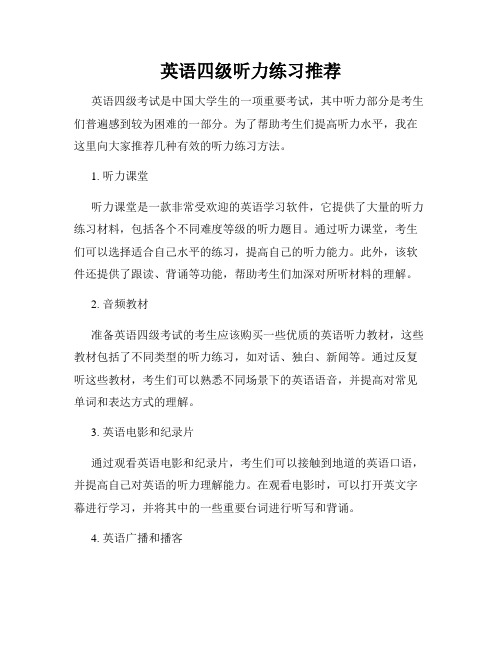
英语四级听力练习推荐英语四级考试是中国大学生的一项重要考试,其中听力部分是考生们普遍感到较为困难的一部分。
为了帮助考生们提高听力水平,我在这里向大家推荐几种有效的听力练习方法。
1. 听力课堂听力课堂是一款非常受欢迎的英语学习软件,它提供了大量的听力练习材料,包括各个不同难度等级的听力题目。
通过听力课堂,考生们可以选择适合自己水平的练习,提高自己的听力能力。
此外,该软件还提供了跟读、背诵等功能,帮助考生们加深对所听材料的理解。
2. 音频教材准备英语四级考试的考生应该购买一些优质的英语听力教材,这些教材包括了不同类型的听力练习,如对话、独白、新闻等。
通过反复听这些教材,考生们可以熟悉不同场景下的英语语音,并提高对常见单词和表达方式的理解。
3. 英语电影和纪录片通过观看英语电影和纪录片,考生们可以接触到地道的英语口语,并提高自己对英语的听力理解能力。
在观看电影时,可以打开英文字幕进行学习,并将其中的一些重要台词进行听写和背诵。
4. 英语广播和播客英语广播和播客是另一种有效的听力练习方式。
通过收听英语广播和播客,考生们可以提高自己对真实场景中的英语听力理解能力。
可以选择一些感兴趣的主题,如新闻、故事、谈话等,经常听取并积累英语听力材料。
5. 听力训练软件还有一些专门为英语四级听力考试设计的训练软件,如四级听力口语训练软件等。
这些软件提供了大量的听力练习题目,并根据不同题型和难度给予相应的反馈和评价。
通过使用这些软件,考生们可以有针对性地进行听力训练,及时发现和改正自己的听力问题。
总之,英语四级听力是需要日常大量积累和反复练习的,通过使用以上几种方法,考生们可以提高自己的听力能力,并为英语四级考试做好准备。
希望大家能够在备考中取得好成绩!。
英语听力课堂训练:奥运会
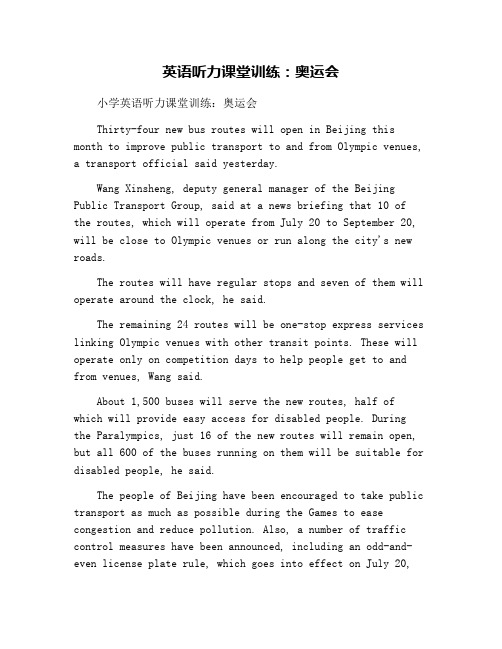
英语听力课堂训练:奥运会小学英语听力课堂训练:奥运会Thirty-four new bus routes will open in Beijing this month to improve public transport to and from Olympic venues, a transport official said yesterday.Wang Xinsheng, deputy general manager of the Beijing Public Transport Group, said at a news briefing that 10 of the routes, which will operate from July 20 to September 20, will be close to Olympic venues or run along the city's new roads.The routes will have regular stops and seven of them will operate around the clock, he said.The remaining 24 routes will be one-stop express services linking Olympic venues with other transit points. These will operate only on competition days to help people get to and from venues, Wang said.About 1,500 buses will serve the new routes, half of which will provide easy access for disabled people. During the Paralympics, just 16 of the new routes will remain open, but all 600 of the buses running on them will be suitable for disabled people, he said.The people of Beijing have been encouraged to take public transport as much as possible during the Games to ease congestion and reduce pollution. Also, a number of traffic control measures have been announced, including an odd-and-even license plate rule, which goes into effect on July 20,and will allow the city's 3.3 million private car owners to drive into the city only on alternate days.As a result, the number of trips made each day on public transport is expected to rise from 4.1 million to 21.1 million, Zhou Zhengyu, deputy director of the Beijing transport committee, told the briefing.Commuters will be served by 21,712 buses, fleets of taxis and the new subway network, he said. Olympic officials, volunteers and reporters will be able to travel free of charge on buses and subways.Also, the operating hours of 350 bus routes will be extended, he said."They will start at 5:30 am and end at 10:00 pm," he said.Bus drivers and conductors have also been told they cannot take holidays during the Games, and their two-day weekends will be reduced to one day, Wang said.To ease traffic congestion, the business hours of shopping malls will be staggered, Zhou said.。
现代大学英语听力3课堂听力答案
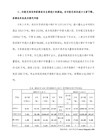
Task 6
A.
1.b. 2.a 3.a 4.c 5.b
B.
I.
A.
1. little use for the liberation of African people
2. to overcome the social and technological backwardness
B.
1.formal education; society
2. catalyst; social change
II.
A. the world`s best ; the most appropriate
Secret 5: come back to China in two ways:
1) come back to see the family and maitian the ties to China
2) come back to China after graduation
Task 4
Harvard ,Stanford;community colleges; state universities; faculties; ethnic minorities;
Subjects and course options; student; consumer; flexibility;specialize; elective courses;
3). You can`t change halfway the subjects you choose to study.
现代大学英语听力1_课堂听力unit_10
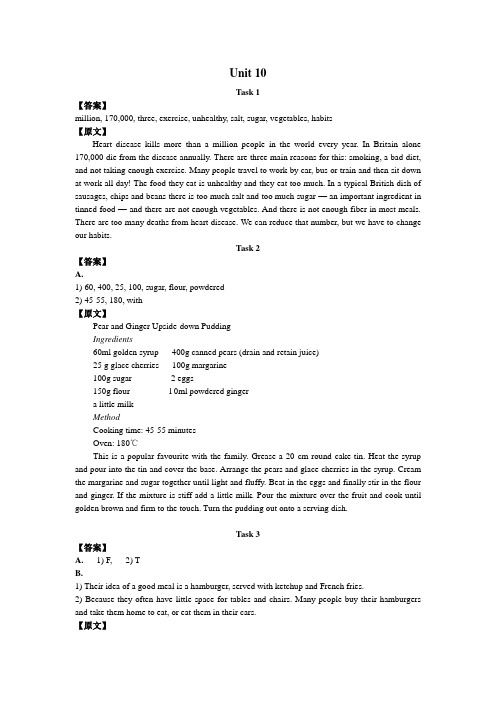
Unit 10Task 1【答案】million, 170,000, three, exercise, unhealthy, salt, sugar, vegetables, habits【原文】Heart disease kills more than a million people in the world every year. In Britain alone 170,000 die from the disease annually. There are three main reasons for this: smoking, a bad diet, and not taking enough exercise. Many people travel to work by car, bus or train and then sit down at work all day! The food they eat is unhealthy and they eat too much. In a typical British dish of sausages, chips and beans there is too much salt and too much sugar — an important ingredient in tinned food — and there are not enough vegetables. And there is not enough fiber in most meals. There are too many deaths from heart disease. We can reduce that number, but we have to change our habits.Task 2【答案】A.1) 60, 400, 25, 100, sugar, flour, powdered2) 45-55, 180, with【原文】Pear and Ginger Upside-down PuddingIngredients60ml golden syrup 400g canned pears (drain and retain juice)25 g glace cherries 100g margarine100g sugar 2 eggs150g flour l 0ml powdered gingera little milkMethodCooking time: 45-55 minutesOven: 180℃This is a popular favourite with the family. Grease a 20 cm round cake tin. Heat the syrup and pour into the tin and cover the base. Arrange the pears and glace cherries in the syrup. Cream the margarine and sugar together until light and fluffy. Beat in the eggs and finally stir in the flour and ginger. If the mixture is stiff add a little milk. Pour the mixture over the fruit and cook until golden brown and firm to the touch. Turn the pudding out onto a serving dish.Task 3【答案】A. 1) F, 2) TB.1) Their idea of a good meal is a hamburger, served with ketchup and French fries.2) Because they often have little space for tables and chairs. Many people buy their hamburgers and take them home to eat, or eat them in their cars.【原文】The younger members of most American families don’t like foreign food. They like hamburgers. Their idea of a good meal is a hamburger, served with ketchup and French fried potatoes, which are called French fries. French fries are not considered foreign; most American children and teenagers love to eat them any time of the day or night.Millions of hamburgers and French fries are eaten every year. Thousands of roadside restaurants prepare and sell them. These are not really restaurants in the usual sense; they often have little space for tables and chairs. Many people buy their hamburgers and take them home to eat, or eat them in their cars.Sometimes it is not necessary to go inside in order to buy the hamburgers. They are ordered through a window in the restaurant and then are handed out through the window to the waiting customer. Sometimes the customer does not even have to get out of his car.When an American family travels abroad, this is almost always the custom that the younger members of the family miss most.Task 4【答案】1) No. They don’t like anything but hamburger.2) Ground sirloin is more expensive than ground chuck, but it has less fat.3) She mixes the salt and pepper and onions with ground beef.4) A patty is a flattened ball.5) Because it will make the hamburger tough. They will be hard and tough.6) Rare, medium, or well-done.【原文】Mrs. Wong: Have you tried cooking Chinese fried rice?Mrs. Adams: Yes, I made it last Saturday, just the way you told me to make it.Mrs. Wong: How did it taste?Mrs. Adams: Not as good as yours, but we all liked it. All except my teenagers. They don’t like anything but hamburgers.Mrs. Wong: Oh, hamburgers! My children keep asking for hamburgers. I get so tired of hearing about hamburgers!Mrs. Adams: I know what you mean. I get tired of making them.Mrs. Wong: How do you make them? I suppose 1 should learn how.Mrs. Adams: They’re very simple, compared to your food.Mrs. Wong: What kind of meat do you buy?Mrs. Adams: Some kind of ground beef. I usually ask for either ground sirloin or ground round steak. It’s more expensive than ground chuck, but it has less fat.Mrs. Wong: How much do you buy?Mrs. Adams: A pound makes four big hamburgers.Mrs. Wong: What do you mix with the ground beef?Mrs. Adams: I just add a little salt, some pepper, and sometimes a little chopped onion. Some people don’t like it with onions, but 1 do.Mrs. Wong: So you mix the salt and pepper and onions with the ground beef.Mrs. Adams: Yes, and divide the mixture into balls. Then make the balls into patties.Mrs. Wong: What is a patty?Mrs. Adams: You just press down on a ball and make it flat. Patties are flattened balls. If you wantto get more than four patties out of a pound of meat, just make the patties thinner.But don’t handle the meat too much.Mrs. Wong: Why not?Mrs. Adams: Because it will make the hamburgers tough. They’ll be hard and tough.Mrs. Wong: Then I suppose you cook them on top of the stove.Mrs. Adams: Yes, in a hot frying pan. Put some butter in the pan and let it melt. Then put the hamburger patties in.Mrs. Wong: How long do you cook them?Mrs. Adams: That depends on how you like them. Some people like them rare— red inside. Mrs. Wong: I don’t like them rare!Mrs. Adams: If you like them medium or well-done, cook them longer.Mrs. Wong: Then you put them between pieces of bread.Mrs. Adams: Most people use special rolls. You put the hamburger inside the big roll, and serve it with ketchup and pickles. I let my family spread ketchup on their own hamburgers,if they want it.Mrs. Wong: Is that all you need to do?Mrs. Adams: That’s all.Task 5【答案】A.1) 4,700, ten, eleven2) London, Paris, same, apple pies, coffee, Cola, orange drink, thick milk3) white, cream, yellow, green4) paper bags, thick paper cupsB.1) F, 2) F, 3) T, 4) TC.1) In an ordinary restaurant you go to a table and sit down. A waiter or waitress brings you a menu and you choose your meal. Then you wait for the food. The waiter brings the food to your table, and at the end of the meal he brings you the bill. Then you pay for the meal and go home.In a fast food restaurant you look at the price list in the widow or on the wall rather than a menu. Then you go to the counter and give your order. You don’t wait for your food. The staff behind the counter have special machines and special routines. They prepare the food very quickly and put it in boxes, cups or bags.2) Because you eat it from the bag or box with your fingers.【原文】Do you want a good meal? Do you want a quick meal’? Then go to a fast food restaurant. There are now thousands of fast food restaurants in the cities of the world. One famous name is Harry’s Hamburgers. Harry’s Hamburgers come from America and they are 22 years old. There are 4,700 Harry’s Hamburgers in 25 different countries. In England the restaurants open at ten o’clock in the morning and close at eleven o’clock at night. They are open every day of the week and every week of the year. But they close on 25th December, Christmas Day. All the restaurants serve the same food. In London or New York, Paris or Madrid, people eat the same hamburgers, French fries and apple pie. And they drink the same drinks: coffee, Cola, orange drink or thickmilk shake.In an ordinary cafe or restaurant you go to a table and sit down. A waiter or waitress brings you a menu and you choose your meal. Then you wait for the food. Sometimes you wait for half an hour. That’s a long time. The waiter brings the food to your table, and at the end of the meal he brings you the bill. Then you pay for the meal and go home.In a fast-food restaurant you don’t sit at a table and look at a menu. You look at the price-list in the window or on the wall, and choose your meal. Then you go to the counter and give your order. You don’t wait for your food. The staff behind the counter have special machines and special routines. They prepare the food very quickly, and put it in boxes, cups or bags.Quarterpounder hamburgers come in white boxes, cheeseburgers in cream boxes, half-pounders in a yellow box and fishburgers in green boxes. They put French fries and apple pies in paper bags and serve all the drinks in thick paper cups. At Harry’s Hamburgers you pay for your meal before you eat it. The person at the counter takes your money and gives you your order. People often eat in the restaurants. They get their food on a tray and take it to a table. Fast food is finger food— you eat it from the bag or box with you fingers. After the meal you put your bags, paper cups and boxes in a big litter bin.Many people don’t eat in the restaurants but take their meal away. They get their order in a strong paper bag and take it to their office, to a park or to their homes. But the food always tastes the same. Millions of people in the world eat it — and like i t. Harry’s Hamburgers sell mi llions of hamburgers in a year.Task 6【答案】1) Two hamburgers, a cheeseburger, two small French-fries, a coffee, a cola and a chocolate milk shake. And it’s take-away.2) Three pounds twenty-one pence.3) They can find little packets of milk and sugar in the bag.【原文】Customer staff: Good morning. What is your order please?Customer: Two hamburgers, a cheeseburger and two small French-fries, please.Customer staff: Do you want drinks?Customer: Yes, please. A coffee, a Cola and a chocolate milk shake.Customer staff: Right. Do you want to eat here or take away?Customer: Take-away please.Customer staff: Two hamburgers, a cheeseburger, two small French-fries, a coffee, a cola and a chocolate milk shake. And it’s take-away. That’s three pounds twenty-one penceplease.Customer: Here you are.Customer staff: Thank you. Here’s one pound seventy-nine pence change. And here’s your order.Customer: Thanks. Is there milk and sugar for the coffee?Customer staff: Yes, there is. We put little packets of milk and sugar in the bag.Customer: I see. Thank you.Customer staff: Thank you. Enjoy your meal.Task 7【答案】1) Tomato soup for Sally and mushroom soup for Peter.2) Sally orders roast mutton with mint, boiled potatoes and some Brussels sprouts. Peter orders roast beef and Yorkshire pudding with gravy, and some boiled cabbage.3) They both have some apple tart and vanilla ice-cream.4) Because both the food and the service there are excellent.【原文】Peter and Sally are having Sunday dinner together at a well-known restaurant in Bayswater. Waiter: Good evening, sir; good evening, madam. There’s a table for two over by the window.This way, please.Peter: Thank you. Could we see the menu, please?Waiter: Certainly. Here you are, sir.Peter: Thank you. Well, now, Sally, what do you fancy?Sally: I think I’ll have some tomato soup first.Peter: And I’ll have mushroom soup. Bring us some rolls and butter with the soup, please. Waiter: Yes, sir.Peter: What kind of meat do you prefer, Sally? I see they have roast beef, pork chops, mutton and steak.Sa lly: I’d like roast mutton with mint, please, and boiled potatoes. Some Brussels sprouts, too, please.Peter: I’ll have roast beef and Yorkshire pudding with gravy, please, and some boiled cabbage. Sally: Afterwards, I’d like some apple tart and vanilla ic e-cream.Peter: The same for me, please. (to Sally) What shall we have to drink, Sally? Some red wine? Sally: French burgundy is my favourite, you know.Peter: All right. (to the Waiter)A bottle of French burgundy, please.Waiter: Straight away, sir.Sally: It’s nice to have a meal out for a change, isn’t it?Peter: Yes, and this is one of my favourite places. Both the food and the service are excellent here.Task 8【答案】A.1) Cosmopolitan means “consisting of people from many different parts of the world”.2) He means that all those kinds of food have already become a normal part of a Londoner’s diet today.3) The Indian and Pakistani restaurants are the cheapest ones.4) No. Almost all the restaurants there serve Cantonese dishes, but there’s one that specializes in Peking cuisine.5) They are going to have a look in the Guanghua Bookshop.B.1) sprung, mushrooms, immensely, with2) under the sun, represented, somewhere or another3) come onto the scene4) all the more5) colorful, atmosphere, overhead6) soup, boiled, As for, sweet, sour, fried chicken, green【原文】Nick and David are walking through Oxford Street looking for a place to eat.Nick: You Londoners certainly have a very cosmopolitan taste these days! It seems almost impossible to find an English restaurant here anywhere. Nearly every restaurant I see seems to be Italian, Greek, Chinese or Indian!David: You’re right. These foreign restaurants have sprung up like mushrooms all over London and have become immensely popular with everyone. There can be no doubt that our eating habits have changed greatly in the past eight or ten years. Italian spaghetti, Greek kebabs and salads, Chinese chicken chow mien and Indian curries are all a normal part of a Londoner’s diet nowadays. In fact, we hardly ever think of such things as being foreign anymore.Nick: This is true in the North of England and the Midlands, as well, at any rate in the larger towns and cities. But here in London, every nationality under the sun seems to be represented in a restaurant somewhere or another.David: Yes. The big American hamburger and steak houses are very popular nowadays. Several Japanese and some Korean and Indonesian restaurants have come onto the scene recently, too.Nick: That makes London all the more fascinating, doesn’t it?David: That’s right. But most of these restaurants are rather expensive.Nick: I hear that the Indian and Pakistani restaurants are the cheapest ones.David: Yes, and the food is usually excellent. But there are plenty of good Chinese restaurants, too, where the prices are very moderate and the meals superb. The best ones are down in Gerrard Street, behind Piccadilly Circus in what we call “Chinatown”.Nick: Why don’t we go to one of them now? Is Gerrard Street far from here?David: No. We’ll just turn right here and go down Wardour Street through Soho. It’ll only take us about ten minutes to get to Gerrard Street.Nick: Wonderful! I’m dead keen on Chinese food, you know.David: Almost all the restaurants there serve Cantonese dishes, but there’s one that specializes in Peking cuisine.Nick: Oh, here we are; I can tell by all those signs in Chinese that this is the street we’re looking for.David: Yes. There are about twelve very good Chinese restaurants here. We’ll have a look at both sides of the street first and then decide on one.Nick: I see that there are some Chinese supermarkets here, too.David: Oh, yes. And there on the right is the Hong Kong Cultural Centre and just beside it, a Chinese cinema. Just around the corner here, in Newport Place, there’s the Guanghua Bookshop, where all sorts of newspapers, books, magazines, records and art from the People’s Republic of China are sold. I know the manager there well. We can go in a nd have a look after we’ve had lunch.Nick: Good. Which restaurant do you recommend?David: “The Far East” is my favourite. They serve both Cantonese and Pekinese dishes. Let’s go in.Nick: What a colourful Chinese atmosphere here with all those red lanterns overhead and thosebeautiful pictures on the wall!Waiter: Good afternoon, gentlemen.Nick: This is fabulous, David; there a re more than 100 Chinese dishes listed here! You’d better do the choosing. I’m not acquainted with very many of them.David: All right. (to the waiter) Two bowls of shark’s fin soup, two large bowls of boiled rice and two spring rolls. As for the mixed dis hes, we’ll have sweet and sour pork with pineapple, fried chicken with garlic sauce and peanuts and a bowl of sliced beef with green peppers. Waiter: What kind of tea would you like, gentlemen, English or Chinese?David: Chinese jasmine tea, please. (to Nick) Can you eat with chopsticks, Nick?Nick: Yes, but not very well.David: Never mind, I’ll teach you how to use them properly. It’s as easy as ABC.Task 9【答案】A.1) Harvest Festival takes place in the autumn.2) Because it started Christianity.3) In the old days farmers kept some of the last corn and decorated it with flowers. They also made little dolls out of corn, which are called corn dollies.B.1) F, 2) T【原文】Harvest Festival takes place in the autumn. It is a very ancient festival which started before Christianity. At the end of the summer people always thanked their gods for the harvest. A good harvest gave everyone food for the winter. A bad harvest brought disaster. In the modern world rich countries can buy food from abroad, so there is always food in the shops. People do not worry about the harvest, but they still celebrate Harvest Festival. They decorate the churches with flowers, fruit and vegetables and have a special service. Many schools celebrate Harvest Festival too. Teachers and students bring food and flowers to decorate the school hall. After the Harvest Festival they take their harvest gifts to Old People’s Homes or to hospitals.In the old days farmers kept some of the last corn and decorated it with flowers. They also made little dolls out of corn, called corn dollies. Each farm kept a corn dolly until the next year, to bring them a good harvest. Today people copy these ancient ideas for their Harvest Festival decorations. Past and present come together in this favorite festival.Task 10【答案】A.1) 18th century, hand, 1742, 18142) height, 1.5, 2, 2,000B.1) Mustard has strong yellow colour and hot taste. We can see it with salt and pepper on every good dinner table.2) There are two main kinds of mustard, one with brown seeds and the other with white. They both produce a rich yellow “flour” and contain mustard oil. The oil form the brown seeds has a strong taste, and the oil from the white seeds is hot, like pepper. Good modern mustard is madefrom both kinds of seed.3) One ton per acre in a good year.【原文】Everyone knows mustard, with its strong yellow colour and hot taste. You see it with salt and pepper on every good dinner table. But where does it come from? How does it get onto our tables?The Romans probably brought mustard to Britain, and farmers in eastern England have grown it ever since. Until the 18th century, people ground the seed by hand, but there have been special mustard mills since 1742. The largest firm in Britain started in 1814 and now exports mustard all over the world.There are two main kinds of mustard, one with brown seeds and the other with white. They both produce a rich yellow “flour” and contain mustard oil. The oil from the brown seeds has a strong taste, and the oil from the white seeds is hot, like pepper. Good modern mustard is made from both kinds of seed. The mustard plant grows to a height of about 1.5 to 2 metres, and each seed can multiply itself 2,000 times in one season.Jimmy Hazel has a 400-acre farm eight kilometres south of Norwich. He does not keep any animals, but grows several different crops: wheat, sugar beet, barley and mustard. He uses 10 percent of his land for mustard.“The mustard seed arrives from the factory at the end of winter— one kilogram for each acre of land. I plant it in March and it usually flowers in June. The mustard fields always look very pretty, but I have to watch out for weeds and insects. When the plants begin to die, I check the seeds. They’re ready when you can shake them in the pod. In August or September we harvest our crop. With a combine harvester it takes about a day to cover the mustard fields. Then I send the seed to the mill, where they check it. If there are any weeds or wheat in the crop, they won’t take it. And I don’t get any money for it! In a good year I produce about 40 tons of mustard seed.”Task 11【答案】A.1) animalsa) pork, beef, mutton, butter, cheeseb) Lambd) chicken, duck, turkey2)a) apples, oranges, bananas, tomatoesb) tea, potatoesc) rice, wheatdifferent plants and animals need different climates1) cool, Scotland, New Zealand2) any part of the world, more milk3) cool4) warm, dry, the Mediterranean5) sun, rain, tropical, Africa, South AmericaB.Bakers, butcher, grocer’s, shops, street market, supermarket, healthy【原文】We all need food. We cannot live without it. What kinds of food do we need? Where does our food come from?There are two basic kinds of food. One comes from animals and the other from plants. Meat comes from animals: we get pork from pigs, beef from cows and mutton from sheep. Lamb is the name for the meat from young sheep, or lambs. Fish from the sea is meat too, and we also eat birds like chicken, duck and turkey. We get other products from birds and animals too. Eggs come from chickens and ducks, and from cows’ milk people make but ter and cheese.From plants we get fruit, vegetables and cereals. A lot of our fruit grows on trees: apples, oranges and bananas. Many small plants have fruit too, like the coffee plant. So coffee is really a fruit drink! What about tea? Tea comes from a plant, but it is not a fruit. We make tea from the leaves of a small plant, so tea is a vegetable. And what about tomatoes? “Tomatoes are vegetables,” people say. “No,they’re not,” say the scientists. “Tomatoes are really fruit.” Some kinds of vegetables grow under the ground. The potato is one example. Different kinds of grass also give us food, called cereals. Rice and wheat are important cereals. Millions of people in the world eat rice or make bread from wheat.Where does our daily food come from? Some people grow their own food, but usually farmers produce our food for us. Different kinds of food come from different countries. Why? Because different plants and animals need different climates. Sheep, for example, have thick woolly coats, so they can live in a cool climate. You find sheep in countries like Scotland and New Zealand. Cows can live in any part of the world, but they produce more milk in cool climates.Apples like a cool climate. They are the number one British fruit. But oranges need a warm, dry climate. So oranges grow well in the countries round the Mediterranean. Bananas like a lot of sun and rain, so they only grow well in the tropical climates of countries in Africa and South America.Many different shops sell food. Bakers sell bread and butchers sell meat. You find eggs, milk, butter and cheese, rice, coffee and tea in a grocer’s shop. You can buy fish, fruit and vegetables from shops or in a street market. And, of course, there is one shop for everything— a supermarket. Remember, you must buy good food for a healthy life. Do you eat the right food?Task 12【答案】1) He wanted to investigate the mysteries of the sausage.2) Because everyone in a food factory has to keep clean and tidy and cover all the hair of the head. 【原文】Announcer: We sent Tom Brown on a special mission. His destination—a town somewhere in Wiltshire and his task — to investigate the mysteries of the sausage.Tom Brown: New York has the Empire State Building; Rome has the Colosseum; Paris has the Eiffel Tower and the Pompidou Centre. But Trowbridge, Trowbridge has Bowyers.Yes I’ve come here to Trowbridge early on a gray January morning, to investigate atopic close to my heart — or rather close to my stomach — something I can reallyget my teeth into. Behind me is the Bowyers factory. I’m about to go through thisgateway of gastrono mic delights, to visit this Mecca of the meat pie. What’s goingon inside, I wonder? Are innocent sausages being frightened out of their skins? Aremeat pies doing their crusts? I’m going in to talk to Mr. Cook, the site manager, toask some important, probing questions. Why are sausages called bangers, forinstance?Mr. Cook: No, I’m sorry, I don’t know. No, I don’t know, no.Tom Brown: I’ve noticed that everyone in the factory seems to be wearing a different kind of white hat.Mr. Cook: Well, everyone in a food factory has to keep clean and tidy and cover all the hair of the head. You will be putting on a hat such as the operators on the shop floor wearwhich is a white peaked hat with a snood down the back to cover all the hair on yourhead.Tom Brown: Yes, I see it’s got a rather fetching hairnet at the back...Task 13【答案】Judy thought that she would enjoy her first day on the job, but everything went wrong. First she overslept. She was so upset about that that she caught the wrong bus. She got to the soft drink factory at nine instead of eight thirty. Her new boss, who was a tall fat man, was very angry. He taught her what to do in a rush. All she had to do was watch a machine fill bottles with Cola. Then she pushed a button and sent the bottles to be capped.At lunch, her boss sent her out to buy him a sandwich. She bought herself some fruit, but dropped it and stepped on it. By the end of the afternoon she felt hungry, bored and tired. And she never wanted to see another bottle of Cola in her life. The next morning she got to work on time and quit!。
名校课堂英语听力八下测试答案

名校课堂英语听力八下测试答案1、She often _______ at 21: [单选题] *A. go to bedB. gets upC. goes to bed(正确答案)D. gets to2、I’d like to know the _______ of the club. [单选题] *A. schedule(正确答案)B. schoolC. menuD. subject3、My brother will come to see me tomorrow. I’ll meet?_______ at the airport. [单选题] *A. herB. youC. him(正确答案)D. them4、I _______ seeing you soon. [单选题] *A. look afterB. look forC. look atD. look forward to(正确答案)5、My brother often does ______ homework first after school.()[单选题] *A. heB. his(正确答案)C. sheD. her6、When you’ve finished with that book, don’t forget to put it back one the shelf, ____? [单选题] *A. do youB. don’t youC. will you(正确答案)D. won’t you7、The carbon we produce when we breathe is much less than()produced by a car. [单选题] *A. oneB. itC. that(正确答案)D. those8、38.—Do you have ________else to say for your mistake?—________but sorry. [单选题] *A.anything; SomethingB.something; EverythingC.anything; Nothing(正确答案)D.something; Anything9、The house is well decorated _____ the disarrangement of a few photos. [单选题] *A. exceptB. besidesC. except for(正确答案)D. in addition to10、6.Hi, boys and girls. How are you ________ your posters for the coming English Festival at school? [单选题] *A.getting onB.getting offC.getting with (正确答案)D.getting11、I saw the boy _______?the classroom. [单选题] *A. enter intoB. enter(正确答案)C. to enter intoD. to enter12、My friends will _______ me at the airport when I arrive in London. [单选题] *A. takeB. meet(正确答案)C. receiveD. have13、It was _____the policeman came_____the parents knew what had happened to their son. [单选题] *A.before…asB. until…whenC. not until…that(正确答案)D.until…that14、We will _______ Mary this Sunday. [单选题] *A. call on(正确答案)B. go onC. keep onD. carry on15、The firm attributed the accident to()fog, and no casualties have been reported until now. [单选题] *A. minimumB. scarceC. dense(正确答案)D. seldom16、Having stayed in the United States for more than ten years, he got an American()[单选题] *A. speechB. accent(正确答案)C. voiceD. sound17、—Whose book is it? Is it yours?—No, ask John. Maybe it’s ______.()[单选题] *A. hersB. his(正确答案)C. he’sD. her18、The soldiers were_____of running away when the enemy attacked. [单选题] *A.chargedB.accused(正确答案)C.scoldedD.estimated19、My brother usually _______ his room after school. But now he _______ soccer. [单选题] *A. cleans; playsB. cleaning; playingC. cleans; is playing(正确答案)D. cleans; is playing the20、--It is Sunday tomorrow, I have no idea what to do.--What about _______? [单选题] *A. play computer gamesB. go fishingC. climbing the mountain(正确答案)D. see a film21、12.Who will ________ the Palace Museum after Shan Jixiang retires? [单选题] *A.in chargeB.in charge ofC.be in charge of (正确答案)D.be in the charge of22、He was very excited to read the news _____ Mo Yan had won the Nobel Prize for literature [单选题] *A. whichB. whatC. howD. that(正确答案)23、Mr. Brown ______ the football match next week.()[单选题] *A. is seeingB. seesC. sawD. is going to see(正确答案)24、In 2019 we moved to Boston,()my grandparents are living. [单选题] *A. whoB. whenC. where(正确答案)D. for which25、My camera is lost. I am ______ it everywhere.()[单选题] *A. looking atB. looking for(正确答案)C. looking overD. looking after26、Where have you _______ these days? [单选题] *A. been(正确答案)B. beC. isD. are27、( ) What _____ fine weather we have these days! [单选题] *A. aB. theC. /(正确答案)D. an28、Don’t _______. He is OK. [单选题] *A. worry(正确答案)B. worried aboutC. worry aboutD. worried29、—______? —Half a kilo.()[单选题] *A. How much are theyB. How much is itC. How much would you like(正确答案)D. How many would you like30、27.Will it ______ warm in the room? [单选题] * A.areB.be(正确答案)C.isD.going to be。
七年级上册英语课堂作业听力

英语课堂作业听力七年级上册英语课堂作业听力一、听懂并识别基本问候语1.Hello!2.Hi!3.Good morning.4.How are you?5.Fine, thank you.6.Good afternoon.7.Good evening.8.Good night.二、识别数字和时间1.One2.Two3.Three4.Four5.Five6.Six7.Seven8.Eight9.Nine10.Ten11.Eleven12.Twelve13.Thirteen14.Fourteen15.Fifteen16.Sixteen17.Seventeen18.Eighteen19.Nineteen20.Twenty21.Twenty-one22.Twenty-two23.Thirty24.Forty25.Fifty26.Sixty27.Seventy28.Eighty29.Ninety30.One hundred31.yesterday 昨日,前一天32.today 今天,今日,现在,当前,目前,本天以后我都叫tomorrow 明天,下一天,后一天,次日。
tonight 在今晚,今晚之内。
用于正规场合或引文时用this evening。
不久以后、日后the day after tomorrow 后天,日后。
用于正规场合或引文时用the day following。
那天以后。
从今往后开始计算the day before yesterday 前天,大前天。
用于正规场合或引文时用the day gone by。
已经过去的某一天。
在句中只用作时间状语 the days gone by 在过去的那段时间,以前,很久以前。
不用冠词,在句中只用作时间状语。
还可以说the day previously 或the former days作时间状语。
第一类:be 的现在式,没有具体时间状语时。
I am , You are , He is , We/You/They are + 时间副词。
初中英语课堂上的听力训练
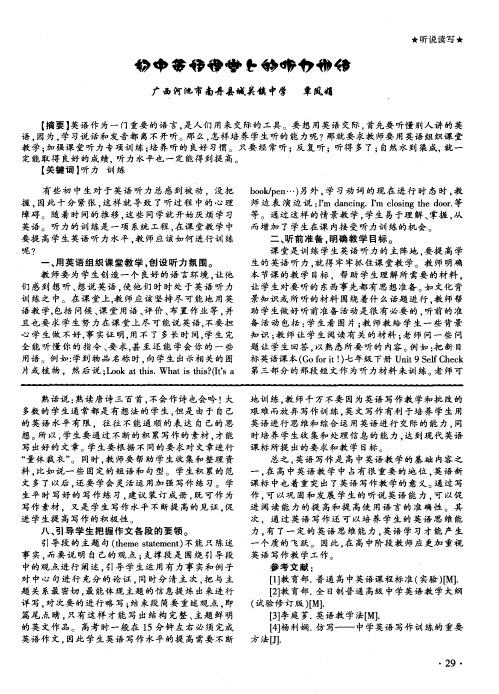
【 关键词】 听力 训练
有 些初 中 生对 于 英语 听 力 总感 到 被 动 。没 把 握. 因此 十 分 紧 张 , 这 样 就 导 致 了听 过 程 中 的 心 理 障碍 。随 着 时 间 的推 移 , 这 些 同 学就 开始 厌 烦 学 > - 7 英语 。听 力 的训 练是 一 项 系统 工程 , 在 课 堂教 学 中 要 提 高学 生 英语 听 力 水 平 . 教 师 应该 如 何 进 行 训 练
语 教 学, 包括 问候 、 课 堂 用语 、 评价 、 布置作业等 , 并 且 也 要 求 学 生努 力 在课 堂 上 尽 可 能 说 英 语 . 不 要 担 心 学生做不好 , 事 实证 明, 用 不 了 多 长 时 间。 学 生 完 全 能听懂你 的指令 、 要 求。 甚 至还 能 学会 你 的 一 些 用语 例 如 : 学到 物 品 名称 时 . 向学 生 出示相 关 的 图 片或 植 物 ,然 后 说 : L o o k a t t h i s . Wh a t i s t h i s ? ( I t ’ S a
第 三部 分 的 那段 短 文作 为 听力 材料 来训 练 老 师 可 地训 练 , 教 师 千 万不 要 因为 英语 写 作教 学 和批 改 的 艰 难 而放 弃 写 作 训 练 , 英 文 写 作 有 利 于培 养 学 生 用
英语 进 行 思 维 和 综 合 运 用 英 语进 行 交 际 的 能 力 . 同
标英 语课 本 ( G o f o r i t ! ) 七 年 级 下 册 Un i t 9 S e I f C h e c k
、
用 英语 组 织 课 堂 教 学 , 创设听力氛围。
听力训练课堂活动
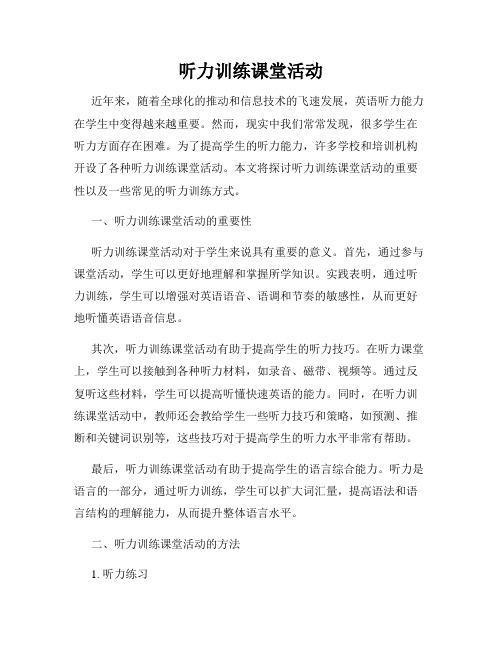
听力训练课堂活动近年来,随着全球化的推动和信息技术的飞速发展,英语听力能力在学生中变得越来越重要。
然而,现实中我们常常发现,很多学生在听力方面存在困难。
为了提高学生的听力能力,许多学校和培训机构开设了各种听力训练课堂活动。
本文将探讨听力训练课堂活动的重要性以及一些常见的听力训练方式。
一、听力训练课堂活动的重要性听力训练课堂活动对于学生来说具有重要的意义。
首先,通过参与课堂活动,学生可以更好地理解和掌握所学知识。
实践表明,通过听力训练,学生可以增强对英语语音、语调和节奏的敏感性,从而更好地听懂英语语音信息。
其次,听力训练课堂活动有助于提高学生的听力技巧。
在听力课堂上,学生可以接触到各种听力材料,如录音、磁带、视频等。
通过反复听这些材料,学生可以提高听懂快速英语的能力。
同时,在听力训练课堂活动中,教师还会教给学生一些听力技巧和策略,如预测、推断和关键词识别等,这些技巧对于提高学生的听力水平非常有帮助。
最后,听力训练课堂活动有助于提高学生的语言综合能力。
听力是语言的一部分,通过听力训练,学生可以扩大词汇量,提高语法和语言结构的理解能力,从而提升整体语言水平。
二、听力训练课堂活动的方法1. 听力练习听力练习是听力训练课堂活动中最常见的方法之一。
在听力练习中,教师会播放一段录音或视频,并提出问题要求学生根据听到的内容做出回答。
通过不断练习,学生可以提高听力技巧和听力水平。
同时,为了增加学生的兴趣和提高效果,可以选择一些有趣的听力材料,如英语歌曲、电影片段等。
2. 听力辅助工具除了常规的听力练习外,各种听力辅助工具也可以用于提高学生的听力能力。
例如,教师可以使用幻灯片展示图片,让学生通过观察图片来理解听力材料中的词汇或内容。
此外,还可以利用录音设备进行分组听力训练,让学生进行对话交流并记录听到的信息。
3. 听力交流活动在听力训练课堂活动中,教师可以组织听力交流活动,让学生在听力的同时也进行口语的训练。
例如,教师可以提供一个听力材料,然后让学生进行小组讨论,分享他们听到的内容以及个人的理解。
大学英语听力2课后练习题含答案

大学英语听力2课后练习题含答案本文档提供了大学英语听力2课后练习题的答案。
这些练习题可以帮助学生巩固课堂上所学的内容,并提高其听力能力。
本文档包括了6个部分,分别对应6个不同的练习题。
注意:这些答案仅供参考,建议学生在完成练习题后,自行校对答案。
第一部分:听力相似词汇辨析1.C2. B3. A4. A5. D6. B7. C8. D9. B 10. A第二部分:听力句型转换1.Does she speak French? → Is she able to speak French?2.She must have left her cell phone at home. → She cannothave her cell phone with her.3.The professor saw the students play soccer. → The professorsaw the students playing soccer.4.She seldom comes to this coffee shop. → She rarely comes tothis coffee shop.5.We ought to clean the house this weekend. → We should cleanthe house this weekend.第三部分:听力短文填空1.interesting2. annoying3. attend4. notes5. improve2.understanding 7. mouth 8. improvement 9. tough 10. worth第四部分:听力问答1.What is the woman doing? She is buying groceries.2.What is the weather like in Seattle? It is rny and windy.3.How long did it take the man to get to the rport? It tookhim about an hour.4.What is the woman allergic to? She is allergic to seafood.5.How many siblings does the man have? He has two siblings.第五部分:听力长对话选择1.C2. D3. B4. A5. C第六部分:听力长篇文章选择1.D2. C3. B4. A5. D结语以上是大学英语听力2课后练习题答案,希望能对学生们提供帮助。
训练英语听力的方法
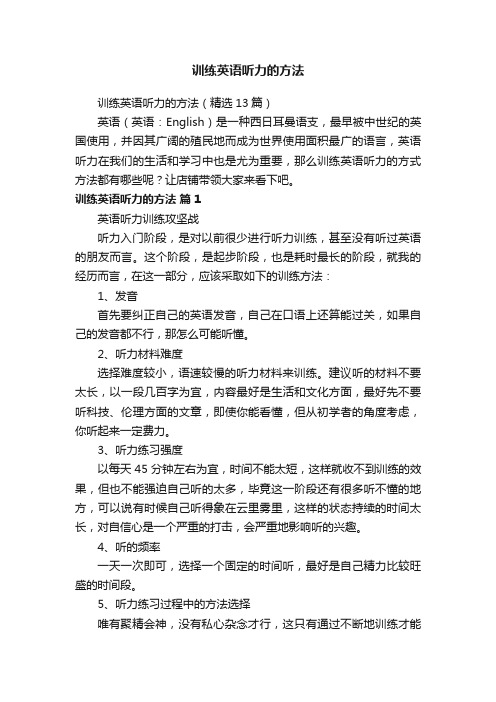
训练英语听力的方法训练英语听力的方法(精选13篇)英语(英语:English)是一种西日耳曼语支,最早被中世纪的英国使用,并因其广阔的殖民地而成为世界使用面积最广的语言,英语听力在我们的生活和学习中也是尤为重要,那么训练英语听力的方式方法都有哪些呢?让店铺带领大家来看下吧。
训练英语听力的方法篇1英语听力训练攻坚战听力入门阶段,是对以前很少进行听力训练,甚至没有听过英语的朋友而言。
这个阶段,是起步阶段,也是耗时最长的阶段,就我的经历而言,在这一部分,应该采取如下的训练方法:1、发音首先要纠正自己的英语发音,自己在口语上还算能过关,如果自己的发音都不行,那怎么可能听懂。
2、听力材料难度选择难度较小,语速较慢的听力材料来训练。
建议听的材料不要太长,以一段几百字为宜,内容最好是生活和文化方面,最好先不要听科技、伦理方面的文章,即使你能看懂,但从初学者的角度考虑,你听起来一定费力。
3、听力练习强度以每天45分钟左右为宜,时间不能太短,这样就收不到训练的效果,但也不能强迫自己听的太多,毕竟这一阶段还有很多听不懂的地方,可以说有时候自己听得象在云里雾里,这样的状态持续的时间太长,对自信心是一个严重的打击,会严重地影响听的兴趣。
4、听的频率一天一次即可,选择一个固定的时间听,最好是自己精力比较旺盛的时间段。
5、听力练习过程中的方法选择唯有聚精会神,没有私心杂念才行,这只有通过不断地训练才能达到。
要做到避免外界因素的干扰。
6、经典听力材料VOA 特别英语:主要是新闻、文化方面的内容,语速90词每分钟,最适合有一定词汇量的听力初学者进行听力锻炼。
我听的时候这个节目的时间段是晚上9点半到10点,我每晚的这个时间都给了SPECIAL ENGLISH,持续了3个月。
建议采取的听力方法:做听力笔记,手中有笔和纸,及时地记下一些不熟知的词汇,因为特别英语的常用词只有1600左右,把这些常用词都弄懂,完全听懂它只是一个时间问题。
三年级听力英语听力训练
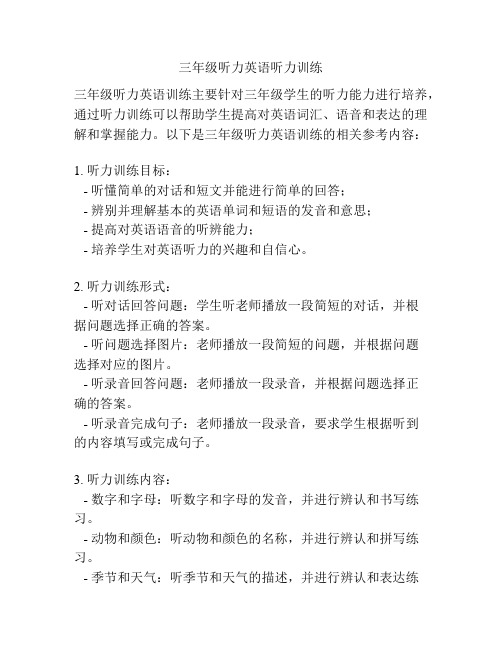
三年级听力英语听力训练三年级听力英语训练主要针对三年级学生的听力能力进行培养,通过听力训练可以帮助学生提高对英语词汇、语音和表达的理解和掌握能力。
以下是三年级听力英语训练的相关参考内容:1. 听力训练目标:- 听懂简单的对话和短文并能进行简单的回答;- 辨别并理解基本的英语单词和短语的发音和意思;- 提高对英语语音的听辨能力;- 培养学生对英语听力的兴趣和自信心。
2. 听力训练形式:- 听对话回答问题:学生听老师播放一段简短的对话,并根据问题选择正确的答案。
- 听问题选择图片:老师播放一段简短的问题,并根据问题选择对应的图片。
- 听录音回答问题:老师播放一段录音,并根据问题选择正确的答案。
- 听录音完成句子:老师播放一段录音,要求学生根据听到的内容填写或完成句子。
3. 听力训练内容:- 数字和字母:听数字和字母的发音,并进行辨认和书写练习。
- 动物和颜色:听动物和颜色的名称,并进行辨认和拼写练习。
- 季节和天气:听季节和天气的描述,并进行辨认和表达练习。
- 日常活动:听日常活动的描述,并进行辨认和模仿练习。
- 词汇和短语:听单词和短语的意思,并进行辨认和运用练习。
4. 听力训练建议:- 定期进行听力训练,保持听力敏感度;- 多听多说多读多写,培养听说能力;- 注意语音的细节,理解发音规律;- 多参与课堂听力练习和小组对话,增强自信心;- 创造轻松愉快的学习氛围,激发学生的学习兴趣。
以上是三年级听力英语训练的相关参考内容,通过合理的听力训练形式和内容,能够有效提高学生对英语的听力理解和应用能力,并能激发学生对英语学习的兴趣和自信心。
2021第二学期三年级英语课堂练习听力材料及参考答案(一)
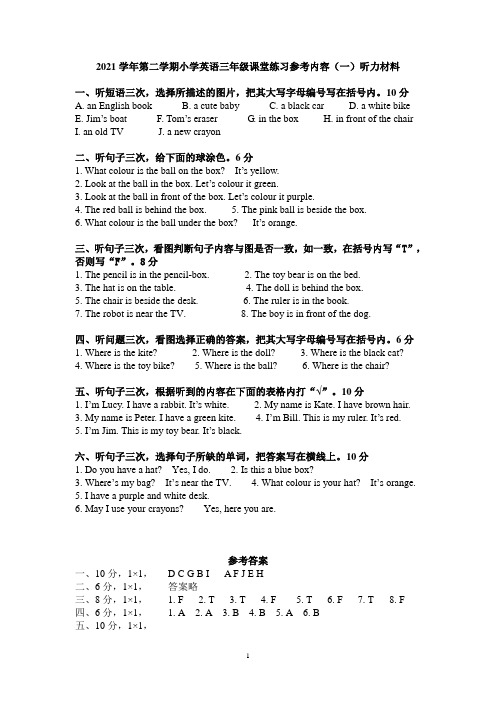
2021学年第二学期小学英语三年级课堂练习参考内容(一)听力材料一、听短语三次,选择所描述的图片,把其大写字母编号写在括号内。
10分A. an English bookB. a cute babyC. a black carD. a white bikeE. Jim’s boatF. Tom’s eraserG. in the boxH. in front of the chairI. an old TV J. a new crayon二、听句子三次,给下面的球涂色。
6分1. What colour is the ball on the box? It’s yellow.2. Look at the ball in the box. Let’s colour it green.3. Look at the ball in front of the box. Let’s colour it purple.4. The red ball is behind the box.5. The pink ball is beside the box.6. What colour is the ball under the box? It’s orange.三、听句子三次,看图判断句子内容与图是否一致,如一致,在括号内写“T”,否则写“F”。
8分1. The pencil is in the pencil-box.2. The toy bear is on the bed.3. The hat is on the table.4. The doll is behind the box.5. The chair is beside the desk.6. The ruler is in the book.7. The robot is near the TV. 8. The boy is in front of the dog.四、听问题三次,看图选择正确的答案,把其大写字母编号写在括号内。
小学三年级语文课堂的听力技巧训练
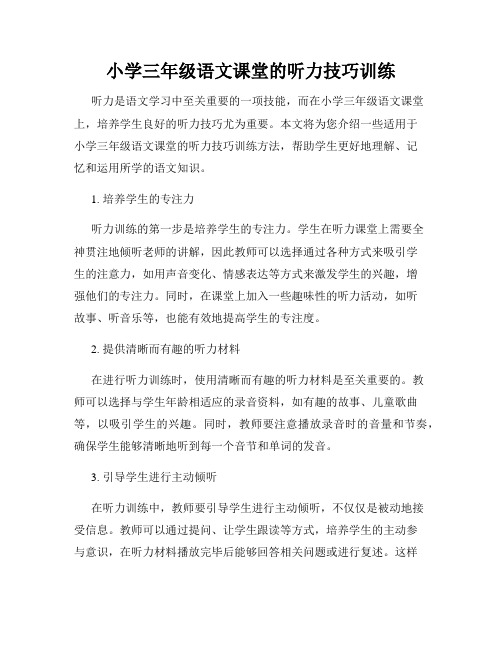
小学三年级语文课堂的听力技巧训练听力是语文学习中至关重要的一项技能,而在小学三年级语文课堂上,培养学生良好的听力技巧尤为重要。
本文将为您介绍一些适用于小学三年级语文课堂的听力技巧训练方法,帮助学生更好地理解、记忆和运用所学的语文知识。
1. 培养学生的专注力听力训练的第一步是培养学生的专注力。
学生在听力课堂上需要全神贯注地倾听老师的讲解,因此教师可以选择通过各种方式来吸引学生的注意力,如用声音变化、情感表达等方式来激发学生的兴趣,增强他们的专注力。
同时,在课堂上加入一些趣味性的听力活动,如听故事、听音乐等,也能有效地提高学生的专注度。
2. 提供清晰而有趣的听力材料在进行听力训练时,使用清晰而有趣的听力材料是至关重要的。
教师可以选择与学生年龄相适应的录音资料,如有趣的故事、儿童歌曲等,以吸引学生的兴趣。
同时,教师要注意播放录音时的音量和节奏,确保学生能够清晰地听到每一个音节和单词的发音。
3. 引导学生进行主动倾听在听力训练中,教师要引导学生进行主动倾听,不仅仅是被动地接受信息。
教师可以通过提问、让学生跟读等方式,培养学生的主动参与意识,在听力材料播放完毕后能够回答相关问题或进行复述。
这样不仅能够加深学生对听力内容的理解,还能够提高他们的语言表达能力。
4. 培养学生的听力记忆力除了理解听力内容,学生还需要通过训练来提高听力的记忆力。
在听力课堂上,教师可以设计一些记忆听力的练习,如听一段音频后要求学生写出听到的内容,或者听一些对话后让学生回答相关问题。
这样的练习可以帮助学生提高对听力内容的记忆,并培养他们在接收信息时的思维能力和逻辑思维能力。
5. 结合多种教学手段进行听力训练在小学三年级语文课堂中,教师可以结合多种教学手段进行听力训练。
比如,教师可以通过图片、动作、游戏等方式来帮助学生更好地理解听力内容,并加强与课文的联系。
同时,教师还可以设计一些听力策略,如让学生根据听到的声音判断是何种语文知识,或者让学生根据所听到的内容进行小组讨论。
